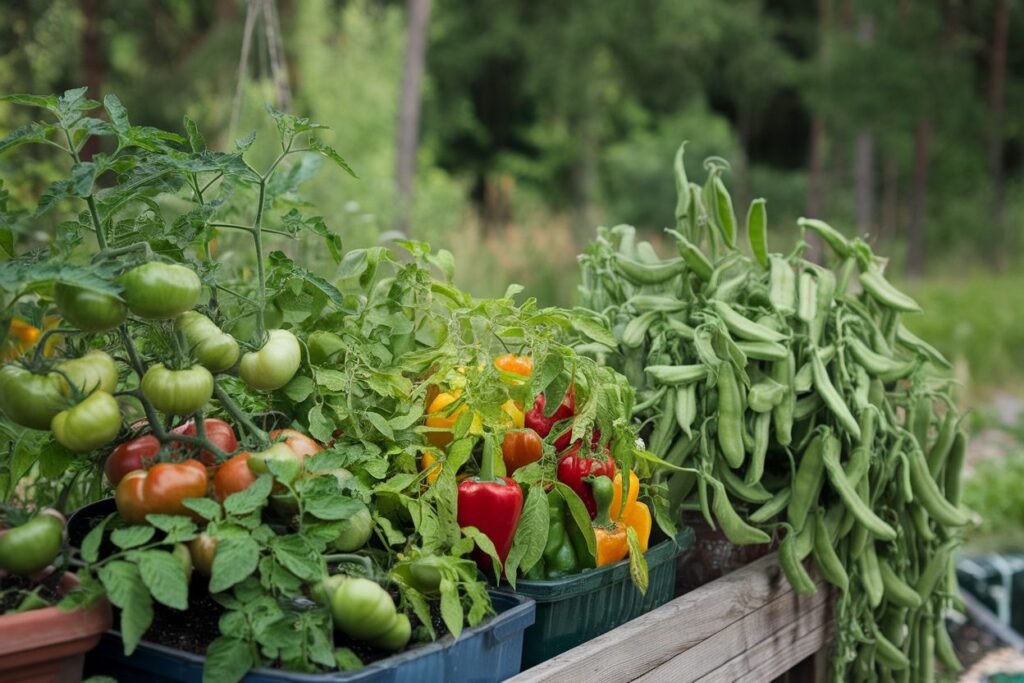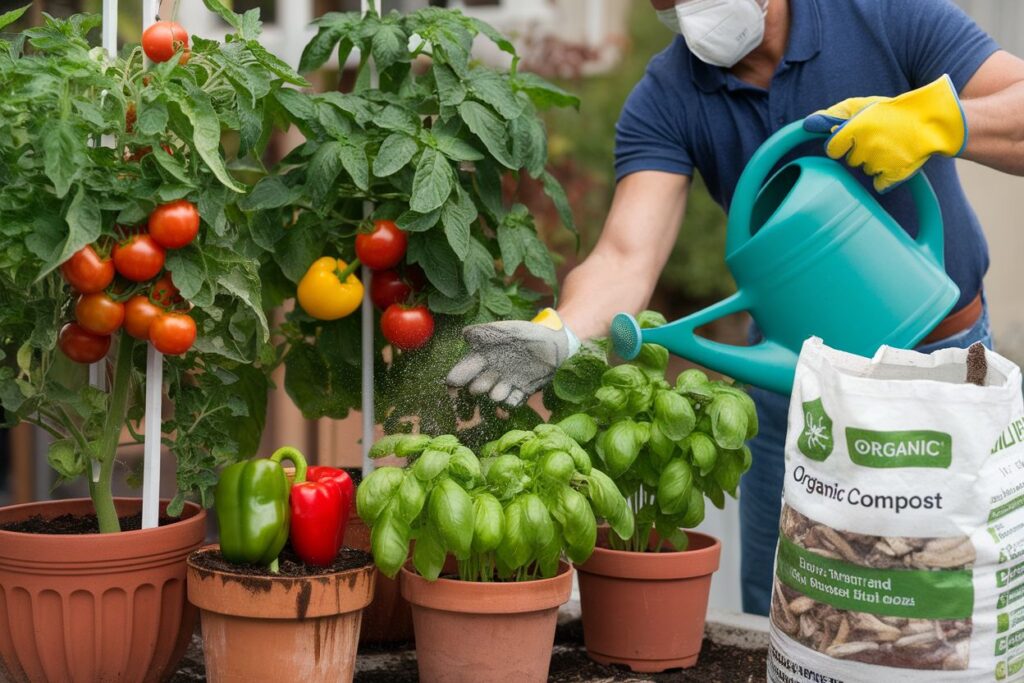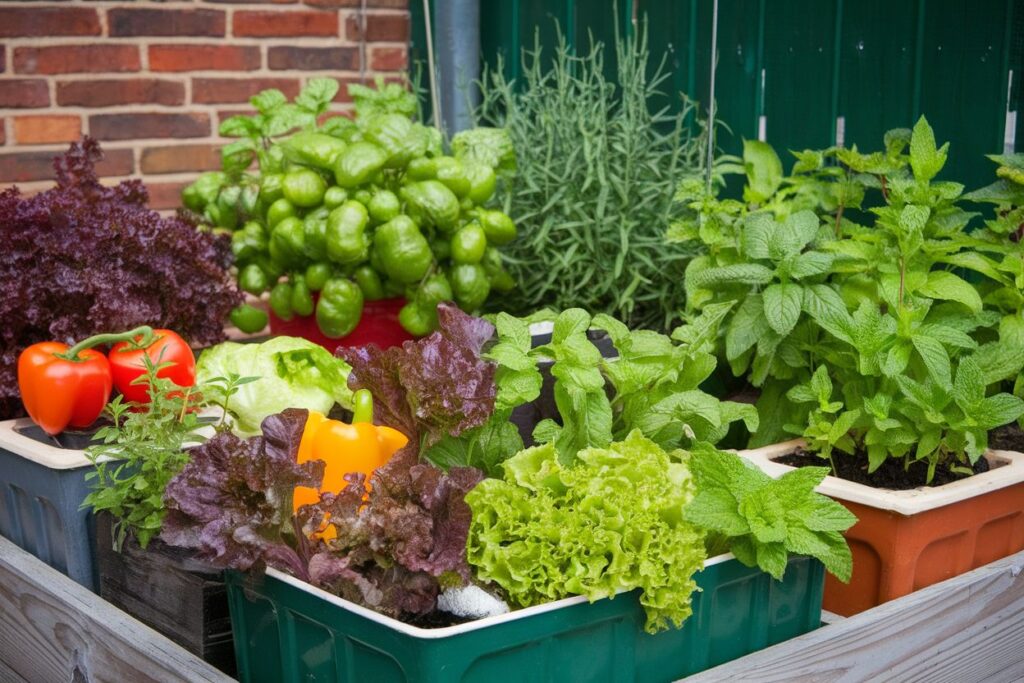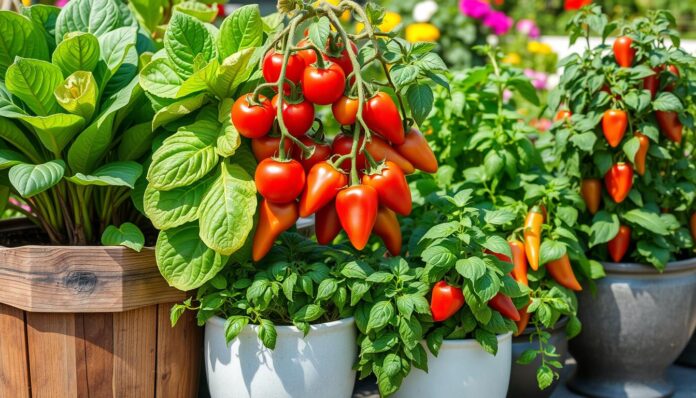Urban dwellers and gardening fans are finding out how great container gardening is. It lets people with little outdoor space grow fresh veggies on their patio or balcony.
Container gardening is a new way to garden in small spaces. It turns tiny areas into places where you can grow your own food. Whether you have a small balcony or patio, the right veggies can make it a garden.
Choosing the best vegetables for container gardening means knowing your space and sunlight. Some veggies grow well in small spaces, giving you lots of food without needing a big garden.
I will show you the best vegetables for container gardening. You’ll learn which ones do best in small spaces. From leafy greens to root veggies, we’ll cover them all.
You’ll also find tips for growing veggies in containers. These tips will help your plants grow strong and give you lots of food, even in small spaces.
Understanding Container Gardening Basics
Container gardening lets you grow veggies in small spaces. It’s great for balconies, patios, or tiny backyards. Learning the basics can make gardening fun and rewarding.
Starting a container garden means knowing what plants need. Choosing the right container size and ensuring good drainage are key. Each choice affects how well your veggies grow.
Selecting the Perfect Container Size
Container size is vital for plant growth. Too small, and roots can’t spread. Too big, and it’s a waste of space. Most veggies need containers 12-24 inches deep, based on their roots.
Ensuring Proper Drainage
Drainage is crucial for container gardening. Without it, roots can rot. Choose containers with many holes and place them on a raised platform to let water drain.
Creating the Ideal Potting Soil
Potting soil is different from garden soil. It should hold moisture, provide nutrients, and let air in. Look for a mix made for containers to help your veggies thrive.
Best Vegetables for Container Gardening

Choosing the right vegetables for containers can turn a small garden into a green paradise. Not all plants do well in tight spaces, but some are made for it. These include compact varieties that grow well in pots.
For those with little outdoor space, there’s still hope. You can grow your own food with dwarf cultivars and high-yield plants. This way, you can enjoy fresh produce right at home.
Container-friendly vegetables are great for small gardens. Compact tomatoes, peppers, and bush beans are perfect for pots. They’re bred to grow in small spaces but still produce lots of food.
Look for plants that grow small naturally. Herbs like basil and parsley, and leafy greens like lettuce and spinach, are great. Miniature eggplants are also a good choice. They all grow well in small spaces and give lots of food.
Root vegetables can also do well in containers. Make sure the pot is deep and has good soil. Radishes, carrots, and small beet varieties grow well in deep pots. They give you fresh, healthy food from your balcony or patio.
Leafy Greens: Perfect Container Crops
Container gardening lets you grow nutritious salad greens and leafy vegetables on your balcony or patio. These plants are great for urban gardeners and those with small spaces. They make it easy to grow fresh produce at home.
Growing Lettuce and Spinach
Lettuce and spinach are excellent choices for container gardening. They grow quickly in shallow containers and give you many harvests. Pick varieties like loose-leaf lettuce and baby spinach for small spaces.
“Small containers can produce big harvests of fresh salad greens with the right care and attention.” – Urban Gardening Expert
Kale and Swiss Chard Tips
Kale and Swiss chard are great for container gardening. They love cooler temperatures and can be picked continuously. Make sure to use containers at least 12 inches deep for their roots.
Herbs as Companion Plants
Herb gardening goes well with leafy greens. Herbs like basil, parsley, and cilantro add flavor and keep pests away. Plant them around your salad greens for a healthy mini garden.
Tomatoes and Peppers: Container Garden Favorites
Container tomatoes and patio tomatoes are great for city gardeners with little space. Determinate varieties grow small and produce lots of fruit. They’re perfect for balconies, patios, and tiny outdoor spots.
Bell peppers and chili peppers also do well in containers. They grow well in small spaces and need the right container size. Containers that are 12-16 inches deep are best for their roots.
For container tomatoes, pick dwarf or determinate types that stay small. ‘Tiny Tim’ and ‘Tumbling Tom’ are great for small gardens. For peppers, ‘Cayenne’ and ‘Jalapeño’ are top choices for containers.
To grow veggies in containers, focus on sunlight, water, and food. Tomatoes and peppers need at least six hours of sun a day. Keep them watered and fertilized well for strong growth and lots of fruit.
Root Vegetables for Container Growing
Container gardening lets you grow tasty root vegetables even in small spaces. It’s important to pick the right container and know how deep the soil should be.
Urban gardeners and those with little space can turn balconies and patios into gardens. They just need to choose deep containers and crops that don’t need a lot of root space.
Carrots and Radishes
Carrots need containers at least 12 inches deep for their long roots. Use narrow, deep containers with loose, sandy soil for the best results. Radishes are great for beginners because they grow fast and don’t need much root space.
Beets and Turnips
Beets and turnips do well in containers with 8-10 inches of soil. They love nutrient-rich soil that drains well and stays moist. Look for compact varieties that fit well in containers.
Container Depth Requirements
Choosing the right container depth is key for healthy root vegetables. Deeper containers prevent roots from getting squished and give veggies room to grow. Don’t forget to add drainage holes and the right soil for a successful garden.
Essential Care and Maintenance Tips

Keeping your container garden healthy is key. It starts with knowing what your plants need. Regular care leads to strong plants and lots of food.
Fertilizing is vital for veggies in pots. Potted plants use up nutrients fast. Use a balanced liquid fertilizer every two weeks. Organic compost is also great for your plants.
Pruning is important for plant growth. Remove dead or yellow leaves often. For tall plants like tomatoes, pruning helps them grow stronger and keeps them from getting too crowded.
Staking is needed for plants that grow up. Tomatoes, peppers, and climbing veggies need strong supports. Put them in early to avoid damaging roots and to help them grow straight.
Rotating crops is still important in containers. Don’t plant the same veggie in the same pot twice. This keeps the soil rich and prevents pests and diseases.
Watching your garden closely is crucial. Look for signs of trouble, like pests or nutrient shortages. With the right care, your container garden will flourish and give you plenty of food.
Common Challenges and Solutions

Container gardening is flexible but comes with its own set of challenges. These can affect plant health and how well they grow. Knowing these issues helps make a successful vegetable garden in small spaces.
Pest Management Strategies
Stopping pests starts with prevention. Check your plants often for signs of bugs. Use natural helpers like neem oil or introduce good bugs to fight pests.
Planting certain plants together can also help. This creates a shield around your veggies that keeps pests away.
Disease Prevention Methods
Diseases can ruin a container garden fast. Make sure plants have enough space and air. Don’t pack them too tight.
Use clean soil and tools to lower disease risk. Get rid of any sick plants right away to stop the disease from spreading.
Watering Issues and Fixes
Getting the right amount of water is key in container gardening. Too much or too little water can stress plants. Check the soil by feeling it with your finger.
Water when the top inch feels dry. Make sure water drains well to avoid root rot.
Look out for signs like wilting or yellow leaves. These mean your plants might not be getting enough water. Use containers that water themselves or special soil to keep moisture steady.
Final Thoughts
Container gardening is a great solution for those with little space. It lets anyone grow tasty vegetables on balconies, patios, or small areas. You can grow everything from leafy greens to juicy tomatoes, proving gardening can happen anywhere.
Container gardening offers more than just veggies. It lets you control the soil and fight pests easily. Plus, you get to enjoy the joy of picking your own food. Even beginners can make a mini garden in small spaces with the right tools and care.
Starting a container garden is easy and doesn’t cost a lot. Pick the right veggies, know the basics, and keep up with care. This way, even a small space can become a garden. It’s perfect for apartments or tiny backyards.
Start growing your own food today. With a little patience and creativity, you can make a garden that gives you fresh, tasty veggies all season long.











